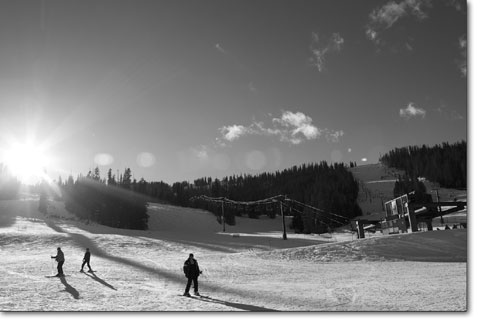| ||
Wolf Creek correspondence vanishes
by Adam Howell In an ongoing round of housecleaning, some scraps of controversy surrounding wetlands at Wolf Creek may have been swept under the rug of public disclosure. Under the rug are e-mails that officials at the Army Corps of Engineers exchanged with the Environmental Protection Agency over the wetlands delineation the Corps approved for the proposed Village at Wolf Creek. While the EPA disclosed its exchanges, an official with the Army Corps deleted theirs, according to Army Corps attorney Dennis Wallace. Embroiled in a heap of public opposition, the proposed “Village” would sit on a 288-acre parcel within the property boundaries of the Wolf Creek Ski Area at the base of the Alberta Lift. The Vail-sized city would include 2,172 residential units and 222,100 square feet of commercial space. In preparation for the development, the Corps approved the wetlands delineation for the developer, Texas billionaire Red McCombs, last summer. But the EPA asked to be involved in the process, given the adverse impacts the project could have on old-growth fens in the area. However, Project Manager Anita Culp, of the Corps’ Southern Colorado Regulatory Office, turned down their request, reacting to an order from her boss at the time, Dan Malanchuk. Culp subsequently deleted her e-mail exchanges, and Malanchuk has since retired, and his correspondence is unobtainable, Wallace said. Because the e-mails were personal to Culp herself, he said they were not considered to be official correspondence. “Anita Culp, first of all, has a regular process of deleting her e-mails,” Wallace said. “A lot of people in the government delete e-mails.” As a general rule, he said, e-mails are recorded or downloaded only if they’re considered pertinent to continued agency use. Moreover, finding a single deleted e-mail would be costly and could take up to a week because of the antiquated software the Corps’ uses, according to Army Corps paralegal Willa Adelmann. “It is very difficult to go back and have computer technicians go in there and recreate e-mails that have been deleted,” Wallace added. “We’re talking probably thousands and thousands of dollars to do this.” A previous Freedom of Information Act request revealed several work-related e-mails from EPA Wetlands Team Leader Geene Reetz to the Corps over wetlands regulation. According to the e-mails, Reetz was unhappy over not being allowed to verify the location of wetlands at the development site. A FOIA request by Colorado Wild, the Durango-based environmental group opposed to the Village, asked for the Corps to reveal any and all communications they had with federal governmental entities, including the EPA, regarding the Wolf Creek wetlands. This inter-agency exchange, however, was not included in initial or subsequent responses. Colorado Wild lawyer Amelia Whiting said in light of the exclusion, the group submitted another “good faith” request before proceeding with appeals and litigation. However, a written response from the Corps described the inquiry as a “duplicate request,” suggesting that communications with the EPA didn’t exist. On the contrary, records from the EPA suggest the communications did occur. In spite of the Corps’ response, agencies must notify their requestors whether they will comply with the FOIA request, the reasons for doing or not doing so, and their right to appeal to the head of the agency. The missing wetlands correspondence comes to light in the context of recent complaints from Colorado Wild, alleging that communications between McCombs’ attorneys and Mineral County staff also were swept under the rug. Those documents, according to Colorado Wild, suggest back-door political meddling with the county’s land-use approval process. Colorado Wild believes those documents were excluded from a 2004 Colorado Open Records Act (CORA) request they made and also were withheld from the administrative record in their lawsuit against Mineral County. The Army Corps correspondence should be part of the administrative record, according to Colorado Wild Executive Director Ryan Bidwell. “I think the issue is more why they got deleted and why they didn’t get included in the project record,” Bidwell said. Colorado Wild attorney Amelia Whiting agreed, concluding that it’s not just a matter of getting the Corps to deal with the e-mails, but it’s also a matter of getting them to look at their policy. “If their practice is to delete e-mails that they feel are compromising or confidential or something that they don’t want to share without claiming a privilege … it is a very troubling practice,” she said. Whiting concluded that the practice should change if the public’s interest is going to be served, saying, “I’m not holding my breath, but I want to make sure they do institute a policy where they do keep those electronic documents and that they keep everything to do with this case because it is very controversial. If they don’t provide additional documents or an acceptable response then we will go ahead and appeal to the Corps, and we’ll take it from there.” •
|
In this week's issue...
- December 18, 2025
- Let it snow
Although ski areas across the West have taken a hit, there’s still hope
- December 18, 2025
- Look, but don't take
Lessons in pottery theft – and remorse – from SW Colorado
- December 11, 2025
- Big plans
Whole Foods, 270 apartments could be coming to Durango Mall parcel


